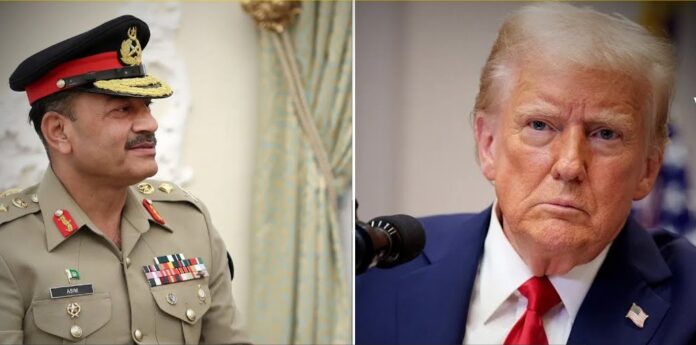Trump hosts Pakistani army chief, sparks new tension with India
US President Donald Trump hosted Pakistani army chief Field Marshal Asim Munir at the White House this week, igniting tensions with India over Trump’s claim that he had “stopped” a recent war between the two nuclear-armed neighbours.
The unprecedented lunch meeting marked the first time a serving Pakistani army chief has been hosted by a US president at the White House, highlighting a shift in the delicate three-way balance between Washington, New Delhi, and Islamabad.
Trump said he felt honoured to host Munir, describing him as a pivotal figure in averting an all‑out conflict with India last month. Speaking to reporters, Trump claimed both Munir and Indian Prime Minister Narendra Modi had acted wisely, saying, “Two very smart people decided not to keep going with that war — that could have been a nuclear war.”
The comments came a day after a phone call between Trump and Modi, in which the Indian PM rejected any assertion of US mediation. According to India’s top diplomat, Foreign Secretary Vikram Misri, Modi stated clearly that the recent ceasefire was achieved through direct military‑to‑military talks between New Delhi and Islamabad. “Prime Minister Modi emphasised that India has not accepted mediation in the past and will never do so,” Misri said.
The Pakistani military confirmed in a statement that Munir and Trump discussed trade, economic development, and cooperation on regional tensions, including those between Israel and Iran. They also talked about deepening long‑term strategic ties, focusing on mutual interests such as trade and digital currencies.
Pakistani experts said Munir aimed to press Trump for restraint in entering Israel’s war with Iran and seek a wider ceasefire. Meanwhile, Pakistani authorities have condemned Israel’s airstrikes on Iran, describing them as a threat to regional stability.
Trump asserted that he had stopped the war between the two nations following the deadly April 22 attack in Indian‑administered Kashmir, which claimed the lives of 26 Indian security personnel. New Delhi accused Islamabad of supporting terrorist elements responsible for the attack, which Pakistan denies.
Days later, India launched airstrikes on what it called terrorist training sites across the Line of Control, triggering four days of hostilities involving fighter jets, missiles, and heavy artillery. Both nations suffered casualties, deepening tensions between the long‑standing rivals.
Trump has framed the cessation of hostilities as a result of US diplomacy, stating he spoke with both leaders and urged them to prioritise trade over conflict. However, Modi’s office maintains that any agreement was brokered exclusively between the two militaries and denies any role for Washington.
“Talks for ceasing military action happened directly between India and Pakistan through existing military channels, and on the insistence of Pakistan,” Misri said, stressing that no third‑party mediation occurred.
Analyst Michael Kugelman from the Asia Pacific Foundation warned that Trump’s statements could complicate relations between New Delhi and Washington. “For Delhi, it’s an age‑old question: how much can it tolerate US‑Pakistan cooperation before it impacts US‑India relations?” he said.
Trump, for his part, said he called for peace and expressed eagerness for closer economic ties with both nations. “I love Pakistan. I think Modi is a fantastic man. We’re going to make a trade deal with Modi of India,” he told reporters.
With tensions still simmering between the South Asian neighbours, the president’s comments have sparked fresh scrutiny of the US role in a crisis that both India and Pakistan claim to have resolved themselves
